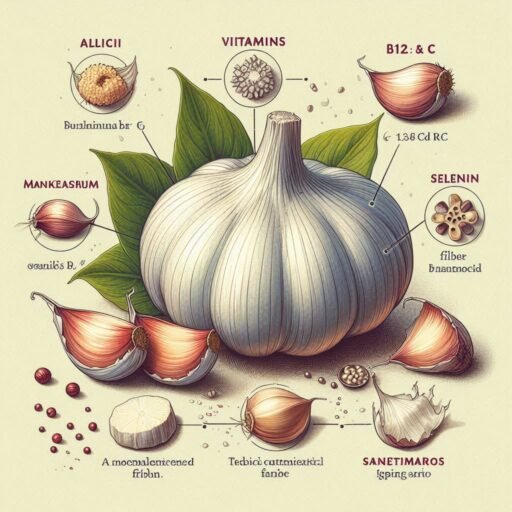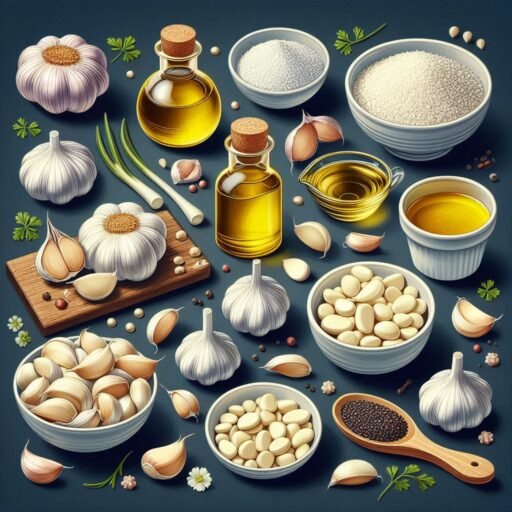Garlic, a staple in kitchens worldwide, is not just a flavorful addition to countless dishes but also a potent healing food with a myriad of health benefits. Known for its distinct aroma and taste, garlic has been used for centuries in traditional medicine to treat various ailments. This comprehensive guide delves into the healing properties of garlic, its nutritional profile, and how you can incorporate it into your diet for optimal health benefits.

Nutritional Profile of Garlic
Garlic is packed with essential nutrients that contribute to its status as a healing food. Here are some key nutrients found in garlic:
Allicin: A sulfur compound responsible for many of garlic’s health benefits.
Vitamins B6 and C: Essential for immune function and overall health.
Manganese: Important for bone health and metabolic function.
Selenium: Supports thyroid function and protects against oxidative stress.
Fiber: Aids in digestion and promotes gut health.
1. Boosts Immune System
Garlic is renowned for its immune-boosting properties. The allicin in garlic has been shown to enhance the function of the immune system by stimulating the production of white blood cells. Regular consumption of garlic can help protect against common illnesses like colds and flu, making it a valuable addition to your diet, especially during the winter months.
2. Reduces Blood Pressure
High blood pressure, or hypertension, is a major risk factor for cardiovascular diseases. Garlic has been shown to have a significant impact on reducing blood pressure levels. Studies have indicated that the active compounds in garlic can help relax blood vessels and improve blood flow, thereby reducing blood pressure. Including garlic in your daily diet can be an effective natural remedy for managing hypertension.
3. Lowers Cholesterol Levels
Garlic can help improve your cholesterol levels, which is essential for maintaining a healthy heart. It has been found to lower total cholesterol and LDL (bad) cholesterol while increasing HDL (good) cholesterol. This balance is crucial for preventing the buildup of plaque in the arteries, reducing the risk of heart disease and stroke.
4. Anti-Inflammatory Properties
Chronic inflammation is linked to a variety of serious health conditions, including heart disease, cancer, and arthritis. Garlic contains compounds that exhibit potent anti-inflammatory effects. By reducing inflammation in the body, garlic can help alleviate symptoms of inflammatory diseases and improve overall health.
5. Rich in Antioxidants
Garlic is loaded with antioxidants, which are compounds that help protect your cells from damage caused by free radicals. These free radicals can contribute to aging and the development of various diseases. The antioxidants in garlic support the body’s protective mechanisms against oxidative damage, making it an essential healing food for longevity and disease prevention.
6. Improves Digestive Health
Garlic promotes healthy digestion by stimulating the production of digestive enzymes. It also acts as a prebiotic, feeding beneficial bacteria in the gut and promoting a balanced microbiome. Regular consumption of garlic can help alleviate digestive issues such as bloating, gas, and constipation, making it a valuable addition to your diet for maintaining a healthy digestive system.
7. Enhances Brain Function
The antioxidants and anti-inflammatory properties of garlic can benefit brain health. Garlic contains compounds that help protect brain cells from oxidative damage and inflammation, which are associated with cognitive decline and neurodegenerative diseases. Including garlic in your diet may help improve memory and cognitive function, reducing the risk of diseases like Alzheimer’s and dementia.
8. Detoxifies the Body
Garlic has detoxifying properties that help remove heavy metals and other toxins from the body. The sulfur compounds in garlic bind to heavy metals and support their excretion through urine. This detoxifying effect can help protect organs from damage caused by heavy metal toxicity and improve overall health.
9. Supports Bone Health
Garlic is beneficial for maintaining strong and healthy bones. It contains nutrients like manganese, vitamin B6, and vitamin C, which are essential for bone formation and maintenance. Additionally, garlic has been shown to increase estrogen levels in women, which can help reduce the risk of osteoporosis and bone fractures.
10. Improves Athletic Performance
Garlic has been used traditionally to enhance physical performance and reduce fatigue. The compounds in garlic can help improve exercise capacity by increasing oxygen utilization and reducing exercise-induced fatigue. Athletes and physically active individuals can benefit from including garlic in their diet to boost endurance and overall performance.

How to Incorporate Garlic into Your Diet
Incorporating garlic into your diet is easy and can be done in various delicious ways. Here are some ideas on how to enjoy this healing food:
Raw Garlic: For maximum health benefits, consume raw garlic. Crush or chop a garlic clove and let it sit for a few minutes before adding it to salads, dips, or dressings.
Cooked Garlic: Add garlic to soups, stews, stir-fries, and roasted vegetables. Cooking garlic can mellow its flavor while still retaining many of its health benefits.
Garlic Supplements: If you find it difficult to consume enough garlic through food, consider taking garlic supplements. Choose supplements that contain allicin for the best results.
Garlic Oil: Use garlic-infused oil for cooking or as a dressing for salads and vegetables.
Garlic Powder: Add garlic powder to season meats, vegetables, and other dishes for a convenient way to include garlic in your meals.

Frequently Asked Questions (FAQ)
Q: How much garlic should I eat daily for health benefits?
A: It is recommended to consume about 1 to 2 cloves of garlic per day to reap the maximum health benefits. If using garlic supplements, follow the dosage instructions provided on the packaging.
Q: Is garlic suitable for people with diabetes?
A: Yes, garlic is suitable for people with diabetes. It has been shown to help regulate blood sugar levels and improve insulin sensitivity, making it a valuable addition to a diabetic diet.
Q: Can garlic help with weight loss?
A: Garlic can be part of a weight loss diet due to its ability to boost metabolism and reduce appetite. The compounds in garlic help increase the body’s energy expenditure and promote fat burning.
Q: Are there any side effects of eating garlic?
A: While garlic is generally safe to consume, eating it in large amounts can cause digestive issues such as heartburn, gas, and diarrhea. Some people may also experience allergic reactions to garlic. If you have any concerns, consult with a healthcare professional before increasing your garlic intake.
Q: What is the best way to store garlic?
A: Store garlic in a cool, dry place with good air circulation. Avoid storing garlic in the refrigerator, as it can cause it to sprout and lose its flavor. Whole garlic bulbs can be stored for several months, while peeled garlic cloves should be used within a week.
Q: Can garlic be eaten on an empty stomach?
A: Yes, eating garlic on an empty stomach is often recommended for its maximum health benefits. It can help boost digestion and detoxify the body. However, some people may experience stomach discomfort, so it is best to start with small amounts.
Q: Is garlic safe to eat during pregnancy?
A: Yes, garlic is safe to eat during pregnancy in moderate amounts. It provides essential nutrients and can help boost the immune system. However, it is always best to consult with a healthcare professional before making significant dietary changes during pregnancy.
Q: Can garlic be used topically for skin issues?
A: Yes, garlic can be used topically to treat certain skin issues such as acne and fungal infections. Crush a garlic clove and apply the juice to the affected area. Leave it on for a few minutes before rinsing off. However, garlic can cause skin irritation in some people, so it is best to do a patch test first.
Q: What is the difference between raw and cooked garlic?
A: Raw garlic contains higher levels of allicin, the compound responsible for many of garlic’s health benefits. Cooking garlic can reduce its allicin content but still retains other beneficial compounds. Both raw and cooked garlic offer health benefits, so it is beneficial to include both in your diet.
Q: Can garlic interact with medications?
A: Yes, garlic can interact with certain medications, including blood thinners and medications for high blood pressure. If you are taking any medications, it is important to consult with a healthcare professional before increasing your garlic intake.
Conclusion
Garlic is a versatile and nutritious healing food that offers a multitude of health benefits. From boosting the immune system and reducing blood pressure to improving digestion and supporting brain health, its rich nutrient profile makes it a valuable addition to any diet. By incorporating garlic into your meals in various delicious ways, you can enjoy its healing properties and improve your overall well-being. So, the next time you’re looking to add a flavorful and health-boosting ingredient to your dishes, reach for some garlic and savor the numerous benefits it has to offer.



